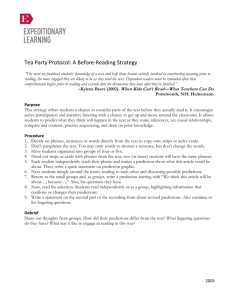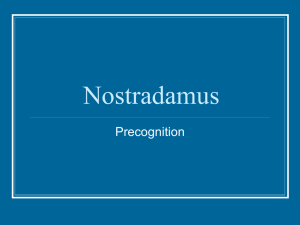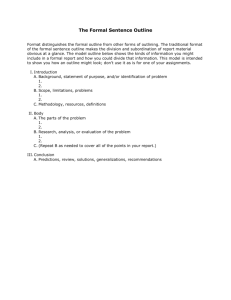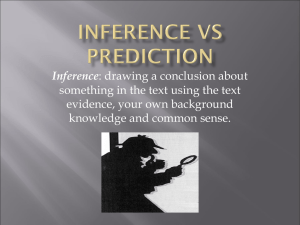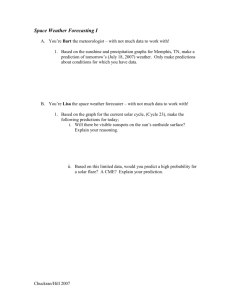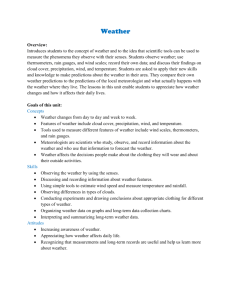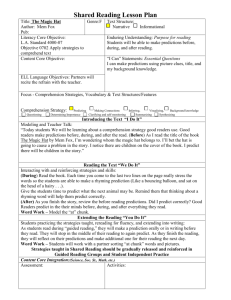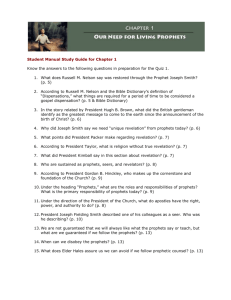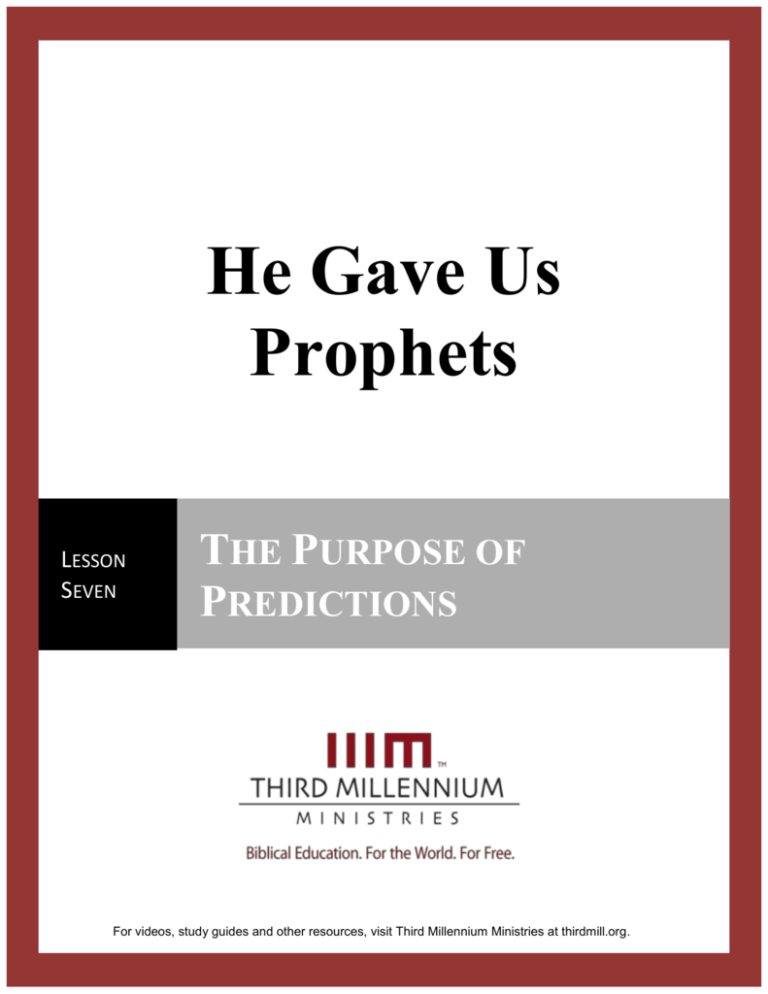
He Gave Us
Prophets
LESSON
SEVEN
THE PURPOSE OF
PREDICTIONS
For videos, study guides and other resources, visit Third Millennium Ministries at thirdmill.org.
For videos, study guides and other resources, visit Third Millennium Ministries at thirdmill.org.
© 2012 by Third Millennium Ministries
All rights reserved. No part of this publication may be reproduced in any form or by any
means for profit, except in brief quotations for the purposes of review, comment, or
scholarship, without written permission from the publisher, Third Millennium Ministries,
Inc., P.O. Box 300769, Fern Park, Florida 32730-0769.
Unless otherwise indicated all Scripture quotations are from the HOLY BIBLE, NEW
INTERNATIONAL VERSION. Copyright © 1984 International Bible Society. Used by
Permission of Zondervan Bible Publishers.
ABOUT THIRD MILLENNIUM MINISTRIES
Founded in 1997, Third Millennium Ministries is a nonprofit Christian
organization dedicated to providing Biblical Education. For the World. For Free.
In response to the growing global need for sound, biblically-based Christian
leadership training, we are building a user-friendly, donor-supported, multimedia
seminary curriculum in five major languages (English, Spanish, Russian, Mandarin
Chinese, and Arabic) and distributing it freely to those who need it most, primarily
Christian leaders who have no access to, or cannot afford, traditional education. All
lessons are written, designed, and produced in-house, and are similar in style and
quality to those on the History Channel©. This unparalleled, cost-effective method
for training Christian leaders has proven to be very effective throughout the world.
We have won Telly Awards for outstanding video production in Education and Use
of Animation, and our curriculum is currently used in more than 150 countries.
Third Millennium materials take the form of DVD, print, Internet streaming,
satellite television transmission, and radio and television broadcasts.
For more information about our ministry and to learn how you can get involved,
please visit http://thirdmill.org.
ii.
For videos, study guides and other resources, visit Third Millennium Ministries at thirdmill.org.
Contents
I.
Introduction .....................................................................................................1
II.
Divine Sovereignty ..........................................................................................1
A. God’s Immutability
2
1. God’s character
2
2. Covenant Promises
2
3. Eternal Counsel
2
B. God’s Providence
3
III. Predictions and Contingencies .......................................................................4
A. General Patterns
5
1. Observation
5
2. Explanation
5
3. Elaboration
6
B. Specific Examples
6
1. Prediction of Shemaiah
7
2. Prediction of Jonah
8
IV. Certainty of Predictions ................................................................................9
A. Conditional Predictions
9
B. Unqualified Predictions
10
C. Confirmed Predictions
11
1. Words
11
2. Signs
11
D. Sworn predictions
12
V.
Goals of Predictions .......................................................................................13
A. Popular Perspectives
14
B. Correct Perspectives
15
1. “Who Knows?” Reaction
15
2. Twofold Reaction
16
VI. Conclusion ......................................................................................................17
iii.
For videos, study guides and other resources, visit Third Millennium Ministries at thirdmill.org.
He Gave Us Prophets
Lesson Seven
The Purpose of Predictions
INTRODUCTION
Anyone who reads Old Testament prophecy soon discovers that the prophets
made many predictions, and if you ask most people why there are so many predictions in
the prophets, they will tell you very simply — it was to tell us about the future. We’re
going to learn in this lesson that the prophets did not make their predictions primarily to
inform us of the future, but rather, they gave predictions to encourage the people of God
to form the future.
We’ve entitled this lesson “The Purpose of Predictions” because we’re going to
explore why the prophets spoke about the future. To discover the purpose of predictions,
we’re going to explore four different topics: First, how did the prophets understand divine
sovereignty over history? Second, what did the prophets believe about their predictions
and human contingencies? Third, how did the prophets understand the certainties of their
predictions? And fourth, what were the goals of predictions in Old Testament prophecy?
Let’s look first at how the sovereignty of God over history shaped the prophets’
understanding of their predictions.
DIVINE SOVEREIGNTY
Have you ever noticed that Christians, like all people, tend to go to extremes?
Either we eat too much or we eat too little, or we exercise too much or we exercise too
little. Well, something like that happens also in theology. Many times when we think
about theological concepts we go to extremes, and this is especially true with the subject
of the sovereignty of God. We find some Christians who emphasize God’s sovereignty
over history to the point that they exclude the reality of human responsibility, and then
we find other people who emphasize the significance of human choice and human
responsibility to the point that they deny the sovereignty of God. There’s so much
confusion in the church at this point over these kinds of concepts that we must pause for a
moment to see the Bible’s view of the sovereignty of God and human responsibility. The
Bible’s doctrine of the sovereignty of God provides an essential background for
understanding the way prophets predicted the future.
There are many ways we can approach the subject of God’s sovereignty, but
we’re going to take a look at two traditional theological themes: first, God’s
immutability; and second, God’s providence. Let’s look first at what the Bible says about
divine immutability.
-1For videos, study guides and many other resources, please visit Third Millennium Ministries at thirdmill.org.
He Gave Us Prophets
Lesson Seven: The Purpose of Predictions
GOD’S IMMUTABILITY
Put simply, the doctrine of immutability teaches that God is unchanging. Now, we
have to be careful when we speak this way because God is not immutable or unchanging,
in every way we might imagine. For many centuries traditional systematic theology has
been careful to identify specific ways in which God is unchanging. In fact, there are only
three major ways in which God may be spoken of as immutable.
God’s Character
In the first place, God’s character does not change. God is always loving, always
just, always knowing all things, always all powerful, always present everywhere. God’s
attributes never vary with time. This is what the writer of Hebrews meant when he wrote
in Hebrews 13:8:
Jesus Christ is the same yesterday and today and forever (Hebrews
13:8).
God cannot become something other than he is. We can count on his character to remain
the same because his attributes are immutable.
Covenant Promises
There’s another sense in which God is immutable beyond his character or
attributes. That immutability has to do with his covenant promises. When God makes a
covenant oath, it remains valid forever and it will never be broken. Once again, the writer
of Hebrews succinctly summarized the teaching of the Scriptures in this matter. In
Hebrews 6:16-17 we read these words:
Men swear by someone greater than themselves, and the oath
confirms what is said and puts an end to all argument. Because God
wanted to make the unchanging nature of his purpose very clear to
the heirs of what was promised, he confirmed it with an oath
(Hebrews 6:16-17).
As this passage makes clear, when God takes an oath in covenant, we can be sure that he
will not vary from what he has said.
Eternal Counsel
A third way in which the Scriptures teach that God is immutable is with regard to
his eternal counsel, or his eternal plan for the universe. Although some Christian groups
-2For videos, study guides and other resources, visit Third Millennium Ministries at thirdmill.org.
He Gave Us Prophets
Lesson Seven: The Purpose of Predictions
fail to see this teaching in Scripture, everything we say in this lesson is built on the belief
that God has an unchangeable plan and that this plan governs all of history. It helps to
summarize this doctrine in a traditional way by referring to the Westminster Confession
of Faith. In the Westminster Confession of Faith chapter 3, paragraph 1 we read these
words about the eternal plan of God:
God, from all eternity, did, by the most wise and holy counsel of his
own will, freely, and unchangeably ordain whatsoever comes to pass.
This confessional statement expresses the sovereignty of God in a very clear way. Put
simply, God has a plan for the universe. It is all-comprehensive, and it cannot fail. The
Apostle Paul spoke of this plan of God in his epistles. For instance, in Ephesians 1:11 he
wrote these words:
[God] works out everything in conformity with the purpose of his will
(Ephesians 1:11).
According to the apostle, God has a plan that includes everything, and God will work all
things according to that plan.
The prophet Isaiah spoke of this all-encompassing plan of God. In Isaiah 46:9-11
we read these words from the prophet:
I am God, and there is no other; I am God, and there is no one like
me, declaring the end from the beginning and from ancient times
things which have not been done, saying, “My purpose will be
established, and I will accomplish all my good pleasure” … Truly, I
have spoken; truly, I will bring it to pass. I have planned it, surely I
will do it (Isaiah 46:9-11, literal).
It’s very important to understand that the prophets believed in the biblical doctrine of the
immutability of God. God is unchangeable in his character, in his covenant promises, and
in his eternal plan for the universe. And so no matter what happened in the history of
Israel, the prophets understood that God would always be true to his character. They
understood he would always keep his firm covenant promises, and they also knew that
God’s counsel and his control over all things would never fail. As we read the prophets,
we’ll discover many times terrible things happened, but this confidence in God’s
immutability always sustained them.
Having seen that the immutability of God formed a background for all prophetic
predictions, we must also remember the other side of the coin. The doctrine of God’s
immutability must be balanced with the doctrine of God's providence.
GOD’S PROVIDENCE
The providence of God may be defined as God’s active involvement in history as
he works out his eternal plan for the universe. According to the Scriptures, God does not
-3For videos, study guides and other resources, visit Third Millennium Ministries at thirdmill.org.
He Gave Us Prophets
Lesson Seven: The Purpose of Predictions
distance himself from his creation simply watching his immutable plan unfold. Instead,
he has a role for himself in his eternal plan. This is why the Bible often speaks of God as
the living God. It is because he is an actor on the stage of history and constantly interacts
with his creation in providence. Once again, the Westminster Confession of Faith can
help us understand these matters plainly. In chapter 5, paragraph 2 we read these words
about the providence of God:
Although, in relation to the foreknowledge and decrees of God, the
first Cause, all things come to pass immutably, and infallibly; yet, by
the same providence, he ordereth them to fall out, according to the
nature of second causes, either necessarily, freely, or contingently.
Here we see, first, that from an eternal perspective the plan of God will be accomplished
without fail, immutably and infallibly. But we also see that from an historical,
providential perspective, God works out his plan by interacting with his creation in
different ways. He interacts with second causes, or creaturely causes, in at least three
different ways. God works out his plan by ordering events so that they follow each other
either necessarily, freely, or contingently. These distinctions are important, so let’s
unpack them just a little bit.
Sometimes the providence of God causes things to happen necessarily. The events
that are in mind here are things that take place according to the regular laws of nature,
laws like the law of gravity. The laws of nature provide predictable and necessary
patterns of providence, yet at the same time, the Confession of Faith also states that some
events occur freely. In other words, they appear random from a human point of view.
Rolling the dice, weather patterns, and other things in life like this are ultimately under
the control of God, but they seem, from a human vantage point, to be at random or freely
associated. Finally, the Confession of Faith tells us that some things happen in history
contingently. Of course, God was always in charge of all these events, but he controlled
the direction of history in these cases by interacting with the contingencies of human
choice.
The prophets not only believed that God’s eternal plan would be absolutely
accomplished without fail, but they also believed that God’s plan involved human choice
and human reaction. This fact played such a central role in the prophetic ministry that we
must take a look at it very carefully. With a background of divine immutability and
providence in mind, we may now turn to our second topic: predictions and contingencies.
PREDICTIONS AND CONTINGENCIES
So far, we’ve seen that sometimes God works out his eternal plan through the
contingencies of human choice. At this point, what we’re going to see is that these kinds
of human contingencies had a significant effect on the predictions of Old Testament
prophecy. Sometimes human choice intervening between the prophetic prediction and the
fulfillment of that prophecy could have a significant influence on the outcome of history.
-4For videos, study guides and other resources, visit Third Millennium Ministries at thirdmill.org.
He Gave Us Prophets
Lesson Seven: The Purpose of Predictions
To explore the relationship between predictions and contingencies, we need to touch on
two subjects: first, the general patterns that the Bible teaches us to expect; and, second,
some specific examples of this dynamic.
GENERAL PATTERNS
Let’s look first at the basic or general pattern involving predictions and historical
contingencies. Perhaps the best passage in the prophets for helping us see this general
pattern is Jeremiah 18:1-10. This passage is so important that we should look at it
carefully. We’ll touch on three aspects of this passage: first, Jeremiah’s observation in
18:1-4; second, the Lord’s explanation in verses 5 and 6; and third, the Lord’s elaboration
in verses 7 through 10.
Observation
Listen first to Jeremiah’s observation in verses 1 through 4:
This is the word that came to Jeremiah from the Lord: “Go down to
the potter’s house, and there I will give you my message.” So I went
down to the potter’s house, and I saw him working at the wheel. But
the pot he was shaping from the clay was marred in his hands; so the
potter formed it into another pot, shaping it as seemed best to him
(Jeremiah 18:1-4).
God tells Jeremiah to go to a potter’s house. Jeremiah entered the potter’s house where he
saw the potter working in one way with the clay and then changing his design when he
saw the clay become marred. The potter worked with the lump of clay, shaping it as
seemed best to him. Jeremiah’s observation at the potter’s house had an important
symbolic value that God wanted Jeremiah to see. So, in verses 5 and 6 the Lord told
Jeremiah the significance of this experience:
Then the word of the Lord came to me: “O house of Israel, can I not
do with you as this potter does?” declares the Lord. “Like clay in the
hand of the potter, so are you in my hand, O house of Israel”
(Jeremiah 18:5-6).
Explanation
This passage reads as many do in the Bible; the potter represented the Lord and
the clay represented Israel. As this passage makes clear, God reserved the right to do with
his people as seemed best to him, just like a potter would with his clay. Of course, as we
have seen, God would never violate his immutable character, nor his covenants, nor his
-5For videos, study guides and other resources, visit Third Millennium Ministries at thirdmill.org.
He Gave Us Prophets
Lesson Seven: The Purpose of Predictions
eternal plan. Yet, within these parameters, God is free to vary the ways he handles his
people.
Elaboration
With the potter’s observation and then God's explanation in mind, we're in a
position the see how God elaborated on this event. In a word, God applied this analogy of
the potter and the clay to prophetic predictions. In the first place, God mentioned
predictions of judgment in verses 7 and 8:
If at any time I announce that a nation or kingdom is to be uprooted,
torn down and destroyed, and if that nation I warned repents of its
evil, then I will relent and not inflict on it the disaster I had planned
(Jeremiah 18:7-8).
Notice the way God described the situation. He says that at any time, with respect to any
nation, he may announce judgment to come. Yet, if there is an intervening historical
contingency of repentance, then God may relent. The fulfillment may not take place as
predicted. In a word, the historical contingency of human choice could make a big
difference in the way God fulfilled a prophecy of judgment.
Now to show that this principle applied also to other kinds of predictions, God
spoke of predictions of blessing in verses 9 and 10:
And if at another time I announce that a nation or kingdom is to be
built up and planted, and if it does evil in my sight and does not obey
me, then I will reconsider the good I had intended to do for it
(Jeremiah 18:9-10).
Notice the parallel situation. God said that at any time, and with respect to any nation, he
may announce the blessing of security and prosperity; yet, if there is an intervening
historical contingency of rebellion and disobedience, then the result may be that God may
relent from doing the good he had intended.
Jeremiah 18 teaches us a principle that we must be ready to apply to every biblical
prophecy. God told Jeremiah that he was free to react to the way human beings responded
to threats of judgment and offers of blessing. As we take a look at biblical prophecy,
we’ll discover that God often watched to see how people would react to the prophetic
word and then determined what to do in their future.
SPECIFIC EXAMPLES
Now that we've seen the general principle of predictions and contingencies, it will
be helpful to see some examples of this principle at work. There are countless examples
of times in the Bible when the contingency of human choice made a big difference in the
-6For videos, study guides and other resources, visit Third Millennium Ministries at thirdmill.org.
He Gave Us Prophets
Lesson Seven: The Purpose of Predictions
fulfillment of prophecies. We’re going to look at just two examples of the many times
this dynamic appears: first, a predication by the prophet Shemaiah, and then the
prediction of Jonah.
Prediction of Shemaiah
Let’s look first at the prediction of Shemaiah. In 2 Chronicles 12:5 we read
Shemaiah’s announcement of judgment:
Then the prophet Shemaiah came to Rehoboam and to the leaders of
Judah who had assembled in Jerusalem for fear of Shishak, and he
said to them, “This is what the Lord says, ‘You have abandoned me;
therefore, I now abandon you to Shishak’” (2 Chronicles 12:5).
Notice that Shemaiah did not offer any explicit conditions for this prophecy. For people
unfamiliar with the ministries of the prophets, it sounds as if Shemaiah revealed an
eternal, unchangeable decree of God. But Rehoboam and the leaders of Judah knew
better. They hoped that these words were just a warning from God, a warning of what
God was going to do if they did not repent. So we find in 12:6 these words:
The leaders of Israel and the king humbled themselves and said, “The
Lord is just” (2 Chronicles 12:6).
When Rehoboam and the leaders of Judah heard the prophecy of judgment, they knew
what to do. They were to call out to God in repentance and faith, seeking for his mercy.
As we continue to read this passage, the intervening historical contingency of
humble prayer had a dramatic effect on the fulfillment of Shemaiah’s prediction. In fact,
Shemaiah himself acknowledged this effect. Listen to what he said after the leaders of
Judah repented. In verses 7 and 8 we read these words:
When the Lord saw that they humbled themselves, this word of the
Lord came to Shemaiah: “Since they have humbled themselves, I will
not destroy them, but will soon give them deliverance. My wrath will
not be poured out on Jerusalem through Shishak. They will, however,
become subject to him, so that they may learn the difference between
serving me and serving the kings of other lands” (2 Chronicles 12:78).
This passage makes clear that Shemaiah’s ministry was much like that of preachers
today. He warned of judgment to come, not so that he could condemn people to
everlasting perdition, but so that the people would hear this warning, repent, and then
receive the grace of God. So we see that the human reaction of prayer made a significant
difference in the way that Shemaiah’s prophecy would be fulfilled. In this case,
Shemaiah’s prophecy was not utterly reversed, but it was mollified, or softened, so that
the attack against Jerusalem was not as great as it would have been.
-7For videos, study guides and other resources, visit Third Millennium Ministries at thirdmill.org.
He Gave Us Prophets
Lesson Seven: The Purpose of Predictions
Prediction of Jonah
A second example of the influence of human reactions to predictions appears in
the book of Jonah. The story of Jonah is familiar to us. We know that God sent Jonah to
the city of Nineveh to announce judgment to come. In Jonah 3:4 this is what Jonah says:
Forty more days and Nineveh will be overturned (Jonah 3:4).
What could be simpler than this prophecy? Jonah announced that the city of Nineveh had
only forty more days before it would be destroyed. There were no “ifs,” there were no
“ands,” and there were no “buts.” But what happened? The rest of the chapter tells us.
The king of Nineveh and the people along with their animals put on sackcloth and ashes
in repentance of their sins. The king announced in 3:7-9:
Do not let any man or beast, herd or flock, taste anything; do not let
them eat or drink. But let man and beast be covered with sackcloth.
Let everyone call urgently on God. Let them give up their evil ways
and their violence. Who knows? God may yet relent and with
compassion turn from his fierce anger so that we will not perish
(Jonah 3:7-9).
Put simply, an intervening historical contingency of repentance took place before the
prophecy could be fulfilled. The people humbled themselves in repentance before the
Lord. And what was the result of this historical contingency? In 3:10 we read these
words:
When God saw what they did and how they turned from their evil
ways, he had compassion and did not bring upon them the destruction
he had threatened (Jonah 3:10).
The fulfillment of Jonah’s prediction was tremendously influenced by the repentance of
Nineveh. He later complained to the Lord in this way in 4:2:
I knew that you are a gracious and compassionate God, slow to anger
and abounding in love, a God who relents from sending calamity
(Jonah 4:2).
Even as he gave his prediction, Jonah knew that God might not carry out the destruction
of the city. In fact, it was not until over one hundred years later that Nineveh was
destroyed by the Babylonians.
From the general principle of Jeremiah 18 and these two specific examples, we
see that many times the contingency of human choice influenced the ways that
prophecies were fulfilled. Sometimes God reversed a judgment or a blessing; sometimes
he would soften a blessing or even lessen a judgment; and other times he would increase
-8For videos, study guides and other resources, visit Third Millennium Ministries at thirdmill.org.
He Gave Us Prophets
Lesson Seven: The Purpose of Predictions
judgments or increase blessings, depending upon how human beings responded to the
prophetic word.
Now that we have seen that intervening historical contingencies can influence the
fulfillments of predictions, we should turn to our next subject. What certainty or
confidence could Old Testament believers have when they heard a prediction? How
confident could they be that God would fulfill the predictions made by the prophets?
CERTAINTY OF PREDICTIONS
To answer this question it will help to review the kinds of predictions we find in
Old Testament prophecy. As we have seen in previous lessons, one axis along which we
may place Old Testament predictions is their variation between covenant blessings and
judgments. Prophetic predictions may be classified as announcing God’s blessings in
nature and war and his judgments in nature and war. We’ve seen another organizational
axis in previous lessons as well. All prophetic predictions fall somewhere along the range
of greater and lesser judgments and blessings. You will recall that many kinds of small
blessings and judgments were announced by the prophets, but the greatest judgment was
the threat of exile and the greatest blessing was restoration after exile. This basic
approach to prophetic predictions helps us see at a glance the basic message that the
prophets gave to their original audiences.
At this point, however, we need to add a third dimension to our organization of
prophetic predictions. Old Testament prophets not only told their listeners about greater
or lesser blessings and judgments, they also indicated, in one way or another, the level of
God’s determination to carry through with these judgments. On one end of the spectrum,
the prophets told their listeners that God had a very low level of determination to carry
through with a particular scenario. On the other end of the spectrum, they indicated that
God was very highly determined to carry through with the predictions. It’s very important
to remember that when the prophets speak of God having high or low levels of
determination to carry out a prophecy, they are speaking of him in very human terms. In
terms of God’s eternal, unchangeable plan, God would always accomplish all that he
desired. But when God was interacting with human creatures and working out his plan in
providence, he sometimes revealed that his determination was very high, and other times
he revealed that his determination was very low.
CONDITIONAL PREDICTIONS
There are many ways to approach this dimension of Old Testament predictions,
but we will point to four different points along the spectrum of God's determination. In
the first place, the prophets made a number of predictions which reveal that God had not
yet committed history to one direction or another. They did this by qualifying their
predictions with explicit conditions. Explicit conditions in the form of "if…then"
statements appear many times in the Old Testament prophets. For instance, in Isaiah
1:19-20 we read this conditional prediction:
-9For videos, study guides and other resources, visit Third Millennium Ministries at thirdmill.org.
He Gave Us Prophets
Lesson Seven: The Purpose of Predictions
“If you are willing and obedient, you will eat the best from the land;
but if you resist and rebel, you will be devoured by the sword.” For
the mouth of the Lord has spoken (Isaiah 1:19-20).
In this passage, the prophet Isaiah makes it very clear that the people of God had a
choice. If they submitted themselves to the Lord, they would be blessed, but if they did
not, they would be judged. Many times, the prophets indicate these kinds of conditions to
let the people know that God was still open to the direction that history would take, and
that direction would be determined by the kinds of choices they made.
UNQUALIFIED PREDICTIONS
A second point along the axis of determination appears in unqualified predictions.
These passages are simple statements about the future. No explicit conditions appear in
them. In such cases, the prophets revealed that at the moment God was more determined
to take the future in a particular direction. But we know from the outcomes of these
predictions that higher levels of human response could turn events in different directions.
We’ve already seen one example of this kind of prediction. In Jonah 3:4 the prophet said
these words:
Forty more days and Nineveh will be overturned (Jonah 3:4).
There are no explicit conditions in this prophecy, and the prophet Jonah is making it clear
that God was determined to destroy the city. Even so, the significant and widespread
repentance within the city of Nineveh caused God to delay his judgment against that city.
Covenant blessings also appear in the form of unqualified predictions. Listen to
what Haggai said to Zerubbabel in Haggai 2:21-23:
“Tell Zerubbabel governor of Judah that I will shake the heavens and
the earth. I will overturn royal thrones and shatter the power of
foreign kingdoms… On that day,” declares the Lord Almighty, ”I will
take you, my servant Zerubbabel son of Shealtiel … and I will make
you like my signet ring, for I have chosen you” (Haggai 2:21-23).
This passage makes it very clear that God was ready to destroy the nations surrounding
Israel and to make Zerubbabel the king over his people.
There are no explicit conditions, yet we know that this never happened.
Zerubbabel never became the king over God’s people and the nations around Israel were
not destroyed. Why was this so? It was because the post-exilic community failed to be
obedient to the Lord and this human contingency had an effect on the way the prophecy
was fulfilled.
-10For videos, study guides and other resources, visit Third Millennium Ministries at thirdmill.org.
He Gave Us Prophets
Lesson Seven: The Purpose of Predictions
CONFIRMED PREDICTIONS
Although some predictions represent God as open to many possibilities, Old
Testament prophets also indicated sometimes that God had a higher degree of
determination to take events in a particular direction. They communicated God’s higher
determination by showing that God confirmed certain predictions. There are two primary
ways in which Old Testament prophets confirmed their predictions: first, God indicated
his higher determination with words; second, he showed his intentions with signs. Let’s
look first at verbal confirmations God offered to his people.
Words
One of the best examples of verbal confirmation appears in the first chapter of
Amos. Listen to what the prophet Amos says in 1:3 of his book:
For three sins of Damascus, even for four, I will not turn back my
wrath (Amos 1:3).
The words, “I will not turn back,” form a repeated feature of the predictions of this
chapter. Why did God repeat this sentence again and again? He wanted to communicate
that he had a high level of determination to carry through with these judgments. But did
this confirmation mean that there was no way to avoid the judgment of God? The prophet
made it very clear that sincere and thorough repentance could still avert the wrath of God.
Listen to what the Lord said in Amos 5:4 and 6:
This is what the Lord says to the house of Israel: “Seek me and live …
Seek the Lord and live, or he will sweep through the house of Joseph
like fire” (Amos 5:4, 6).
Amos chapters 1 and 2 show that God was highly determined to send his wrathful fire
even against Israel, but this passage demonstrates that sincere and extensive repentance
might still have an effect on the wrath of God. Many passages in Old Testament prophecy
are like this. The prophets indicate how highly determined God is by using words to
confirm his determination. They did this in order to motivate their listeners to seek God
earnestly and to repent sincerely.
Signs
Prophets not only added verbal confirmations of God’s heightened determination,
they also revealed higher levels of divine intention by coupling their predictions with
signs. Throughout the Old Testament, we find that prophets performed various signs and
symbolic actions to make it clear that God had very high levels of determination to do
-11For videos, study guides and other resources, visit Third Millennium Ministries at thirdmill.org.
He Gave Us Prophets
Lesson Seven: The Purpose of Predictions
certain things. When a sign accompanied a prophecy, it showed that God was very
determined to carry out what the prophet had predicted.
One very clear example of this practice appears in Isaiah 7. You’ll recall that
Isaiah warned Ahaz that he should trust God as the Syrians and the Israelites were
coming against him. But Ahaz refused, and so God said this to him in Isaiah 7:11:
Ask the Lord your God for a sign, whether in the deepest depths or in
the highest heights (Isaiah 7:11).
Isaiah offered the king confirmation that God would take care of him, but in hypocrisy
Ahaz refused. So God gave a sign, but instead of being a sign of salvation it became a
sign of condemnation.
So we see that the prophets not only gave conditional predictions and unqualified
predictions, they also confirmed many of their prophecies with words and signs to reveal
that God had a high level of determination to carry through in a particular direction.
SWORN PREDICTIONS
A fourth type of prediction reveals in no uncertain terms that God was fully
determined to carry out what He said through the prophets. These types of predictions
take the form of divine oaths.
Often the words of prophets simply announce that God has sworn to do
something. For instance, in Amos 4:2 God takes an oath that the rich women of Samaria
will be taken away by enemies. Listen to how the prophet says it:
The Sovereign Lord has sworn by his holiness: “The time will surely
come when you will be taken away with hooks” (Amos 4:2).
Another oath formula appears in Ezekiel 5:11. There we read these words:
Therefore as surely as I live, declares the Sovereign Lord, because you
have defiled my sanctuary with all your vile images … I myself will
withdraw my favor (Ezekiel 5:11).
When God adds an oath to a prophetic prediction, it raises that prediction to the level of a
covenantal certainty. God took oaths in his covenants that he would carry out all that he
said he would do. When the prophets add a divine oath to a prediction, it indicates that
God is absolutely determined to carry through with what he had said.
Now, while it is true that God was utterly determined to carry out predictions
qualified by oaths, we must still see that there is some latitude for God to react to
intervening historical contingencies in some ways. Often the question of “when” remains
in the balance; timing can be influenced by the reactions of people who hear a prediction.
Second, precisely who will experience the prediction often remains a flexible matter. And
third, the means by which a prediction will take place is often left unspecified. And
fourth, to what degree a prediction will be fulfilled always remains an open question.
-12For videos, study guides and other resources, visit Third Millennium Ministries at thirdmill.org.
He Gave Us Prophets
Lesson Seven: The Purpose of Predictions
Consider the oath of judgment found in Amos 6:8:
The Sovereign Lord has sworn by himself — the Lord Almighty
declares: “I abhor the pride of Jacob and detest his fortresses; I will
deliver up the city and everything in it” (Amos 6:8).
Although earlier in his book Amos left the possibility of escape, it is clear at this point
that Amos utterly condemns Samaria to destruction. Yet it’s also evident that this oath
does not answer questions that still remain open, such as, when? Will this destruction
happen soon, or will it be postponed? Who or which people precisely will die, be exiled,
or who will escape, is still left open, and by what precise means God will destroy is not
specified. And in fact, to what degree this destruction must take place is open as well.
These questions remain to be answered in the light of the reactions which the Israelites
had. Their prayers and repentance, their rebellion and defiance, could make tremendous
differences in the fulfillment of this prediction.
A similar situation held true for divine oaths of blessing. For instance, in Isaiah
62:8 we read this oath to those who returned from exile:
The Lord has sworn by his right hand and by his mighty arm: “Never
again will I give your grain as food for your enemies, and never again
will foreigners drink the new wine for which you have toiled” (Isaiah
62:8).
It is clear from this passage that God swore to bring his people back to the Promised
Land, and so the people could be sure that this prediction would take place. Still, there
were questions that remained: When would God do this? Who would be brought back to
the land? By what means would he accomplish this restoration? And to what degree
would this restoration take place? In prophecies with oaths, these kinds of questions
always remain open.
So we see that Old Testament prophets indicated that God had different degrees
of determination to direct the future in one way or another. Some prophecies explicitly
indicated that they were wide open. Others are implicit in this regard. Still other
prophecies were confirmed by words and signs. And, finally, some predictions were
made sure by divine oaths.
As we study the predictions of Old Testament prophets it is always important to
remember the connection between predictions and intervening historical contingencies.
God had various levels of determination to carry through with what the prophets said, and
we’ll be at a great disadvantage if we don’t remember these various levels of
determination.
GOALS OF PREDICTION
Now that we've seen how the prophets understood the certainty of their
predictions, we're in a position to discern the goals of prophetic predictions. Why did the
-13For videos, study guides and other resources, visit Third Millennium Ministries at thirdmill.org.
He Gave Us Prophets
Lesson Seven: The Purpose of Predictions
prophets make predictions? What were their purposes? To answer this question, we need
to touch on, first, popular perspectives, and second, correct perspectives on the purpose
of predictions.
POPULAR PERSPECTIVES
Let’s look first at a widespread misconception of the purpose of Old Testament
predictions. If there’s one dominant view of the purpose of predictions in the Old
Testament, it can be summed up in the word “prognostication.” As we know, when
medical professionals speak of a prognosis, they’re telling us what they think the
outcome of an illness or a condition may be in the future. In many ways, this is the way
many Christians understand the prophets. They believe that prophets simply foretold the
future; they gave foreknowledge of things to come. Now, there is an element of truth in
this view. The prophets reveal that at any given time God was determined to go this way
or that way. Yet we must always remember that intervening historical contingencies
could have significant effects on the ways that prophecies were fulfilled.
One passage stands behind this popular preoccupation with prognostication, and
that is Deuteronomy 18:20-22. In this passage, Moses declared a criterion by which Israel
was to determine if a prophet was a true or false prophet. Verse 21 amounts to a question
which Moses asked on the behalf of the Israelites:
You may say to yourselves, “How can we know when a message has
not been spoken by the Lord?” (Deuteronomy 18:21).
Verse 22 gives a response to that question:
If what a prophet proclaims in the name of the Lord does not take
place or come true, that is a message the Lord has not spoken. That
prophet has spoken presumptuously. Do not be afraid of him
(Deuteronomy 18:22).
A widespread misunderstanding of this passage runs something like this: if a true prophet
of the Lord says anything, then that thing must happen just as he said it. But to apply
Moses’ test of a true prophet properly, we must remember what we have already seen in
this lesson. We must not approach the words of prophets woodenly. We have to consider
the intentions behind prophetic predictions. When prophets spoke, they did not always
intend to give the impression that what they were predicting was absolutely certain. Their
words revealed, sometimes explicitly and other times implicitly, that human reactions
could influence the fulfillment of a prediction. So, when we apply Moses’ test of
prophets, we always have to ask not just what did the prophet say explicitly, but also
what implicit conditions apply to their predictions.
Moses and Israel knew that this was true of prophecy. They knew that only divine
oaths secured the certainty of a future event. They also knew that when prophets spoke
words of judgment, the prophets usually did not utterly condemn to judgment, but simply
warned of judgment. They understood that unless prophets indicated a divine oath had
-14For videos, study guides and other resources, visit Third Millennium Ministries at thirdmill.org.
He Gave Us Prophets
Lesson Seven: The Purpose of Predictions
taken place, they did not promise blessing, but offered blessing. In these cases, Moses’
tests would have to be qualified by the occurrence of significant intervening historical
contingencies. In other words, so long as some significant human reaction did not affect
the process, then Moses’ tests would apply easily. Otherwise, the possibility of God’s
response would have to be factored in. Onlookers would have to ask the question, did
significant intervening historical contingencies occur? If they did, then Moses’ tests
would have to be adjusted appropriately.
CORRECT PERSPECTIVES
If it is a misconception to think that prognostication was the main goal of
prophecy, then what was the main purpose for prophetic predictions? Simply put, the
prophets spoke of a future primarily to motivate or to activate their listeners. Another
way to put it was that the prophets did not want so much to inform their listeners about
the future as much as they wanted to activate their listeners to form the future.
To understand this outlook on prophetic predictions, it will help to look at the way
Old Testament believers responded to the predictions of prophets. First, we will see what
we call the “Who knows?” reaction; and then second, we’ll see what we may call the
“twofold” reaction. These reactions of the people of God will help us see the goals of
prophetic predictions more clearly.
“Who Knows?” Reaction
In the first place, we should look at the “Who knows?” reaction. On three
occasions in the Old Testament, when people heard a prophetic prediction, they had a
reaction that may seem strange to us. Instead of saying, “Well, now we know what the
future holds,” they said, “Who knows?” or, as they said in Hebrew, mi yode‘a.( ֵ֔יֹודע
ֵ֔ ) ֵ֔מי
This “Who knows?” reaction took place in three situations worth noting. First,
when Nathan confronted David over his adultery with Bathsheba, he made this prediction
to him in 2 Samuel 12:14:
Because by doing this you have made the enemies of the Lord show
utter contempt, the son born to you will die (2 Samuel 12:14).
Nathan predicted that David’s son would die, and as we find out, he did. But David later
explained to the people in his court what he was thinking after Nathan had given his
prediction, but before the child had actually died. He says these words in 2 Samuel 12:22:
While the child was still alive, I fasted and wept. I thought, “Who
knows? The Lord may be gracious to me and let the child live.” But
now that he is dead, why should I fast? (2 Samuel 12:22).
-15For videos, study guides and other resources, visit Third Millennium Ministries at thirdmill.org.
He Gave Us Prophets
Lesson Seven: The Purpose of Predictions
Instead of accepting the prophetic word as inevitable, David still wondered if the
prediction could be averted through prayer and repentance. His efforts did not work
because his son died anyway, but David’s attitude is clear. Until the child actually died,
David held out hope, the hope of “Who knows?”
In a similar way, the prophet Jonah told the city of Nineveh that judgment was
coming. In 3:4 of his book, we read this prediction:
Forty more days and Nineveh will be overturned (Jonah 3:4).
Once again, we might have expected the people of Nineveh simply to accept the
prophet’s prediction as inevitable, but they did not. Instead, they responded as David did.
In Jonah 3:9 the king of Nineveh said:
Who knows? God may yet relent and with compassion and turn from
his fierce anger so that we will not perish (Jonah 3:9).
On a third occasion, the same reaction to prophecy takes place. In Joel 2:1-11 the
prophet announced that a terrible judgment was coming against Jerusalem. Yet Joel
nevertheless encouraged his listeners to repent and fast. His reason for encouraging
repentance and fasting is made clear in 2:14. There, we read these words:
Who knows? [God] may turn and have pity (Joel 2:14).
Joel was convinced that so long as his prediction was not completely fulfilled, it was
good for the people to seek God’s forgiveness because no one could know just how God
might react to that intervening historical contingency.
What do these “Who knows?” reactions teach us about Old Testament believers?
Old Testament believers did not think that prophetic predictions sealed their fates.
Instead, they always believed that it was possible for intervening historical contingencies
— especially the contingency of prayer — to have a significant effect on the ways that
prophecies were fulfilled.
Twofold Reaction
The “Who knows?” reaction leads us to a broader understanding of the goal of
Old Testament prophecy. The prophets expected and hoped for a two-fold reaction to
their predictions. On the one hand, the prophets knew that there was one way to ensure
that a threatened judgment would take place, if not grow worse. This way was to ignore
the warning of a prediction and to remain in rebellion against God. At the same time,
when prophets announced that God had decided to send a covenant judgment against his
people, they wanted the people to turn to God in hopes that the judgment might be
removed. Repentance and trust in Yahweh was the only hope for avoiding the judgment
of God. On the other side, when prophets gave oracles of blessing, they also wanted to
incite reactions from their readers. They could be sure that flagrant rebellion against God
-16For videos, study guides and other resources, visit Third Millennium Ministries at thirdmill.org.
He Gave Us Prophets
Lesson Seven: The Purpose of Predictions
might remove the predicted blessing and replace it with judgment, but continued faithful
living would bring the promised blessing for sure.
Put simply, the prophets gave their predictions of judgment and blessings to
encourage their listeners to seek to avoid judgment and to accelerate the blessings of God
by their actions. In this way, the goal of prophetic predictions was not primarily to
prognosticate, but to activate the people of God in the service of the Lord.
CONCLUSION
So it is that we have seen four topics in this lesson on the purpose of predictions
First, we touched on divine sovereignty over history, then predictions and contingencies,
third, we saw the certainty of predictions and then finally, the goals of predictions. The
concepts we’ve touched on in this lesson are absolutely essential for understanding Old
Testament prophecy. Old Testament prophets were not trying to talk about history in
advance so that people could simply learn what was going to happen in the future. They
were activating people to seek the mercy of God so they could avoid judgment and find
the blessings of God. As we read Old Testament prophecy, we must be activated to seek
the blessing of God and to avoid his judgment as well.
-17For videos, study guides and other resources, visit Third Millennium Ministries at thirdmill.org.

